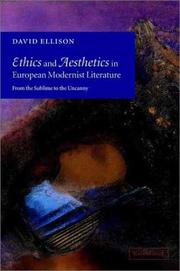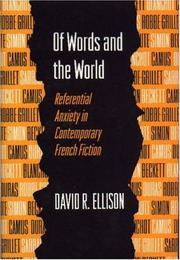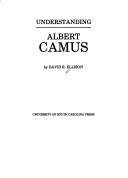| Listing 1 - 9 of 9 |
Sort by
|
Book
ISBN: 0631135693 Year: 1984 Publisher: Oxford ; London ; Edinburgh... [et al.] : Basil Blackwell,
Abstract | Keywords | Export | Availability | Bookmark
 Loading...
Loading...Choose an application
- Reference Manager
- EndNote
- RefWorks (Direct export to RefWorks)
Proust, Marcel --- Books and reading in literature --- Livres et lecture dans la littérature --- Proust, Marcel, --- Ruskin, John, --- Criticism and interpretation. --- Influence --- Proust. --- 82-31 --- Roman --- 82-31 Roman --- Livres et lecture dans la littérature --- Influence. --- PROUST (MARCEL), 1871-1922 --- STYLE

ISBN: 1107124336 0511013612 1280154942 051111978X 0511154526 0511328419 0511485743 0511044321 9780511013614 9780511154522 9780511119781 9780511044328 9780521806800 0521806801 9780511485749 9781280154942 9780521025164 0521025168 Year: 2001 Publisher: Cambridge, U.K. ; New York : Cambridge University Press,
Abstract | Keywords | Export | Availability | Bookmark
 Loading...
Loading...Choose an application
- Reference Manager
- EndNote
- RefWorks (Direct export to RefWorks)
David Ellison's book is an investigation into the historical origins and textual practice of European literary Modernism. Ellison's study traces the origins of Modernism to the emergence of early German Romanticism from the philosophy of Immanuel Kant, and emphasizes how the passage from Romanticism to Modernism can be followed in the gradual transition from the sublime to the uncanny. Arguing that what we call High Modernism cannot be reduced to a religion of beauty, an experimentation with narrative form, or even a reflection on time and consciousness, Ellison demonstrates that Modernist textuality is characterized by the intersection, overlapping, and crossing of aesthetic and ethical issues. Beauty and morality relate to each other as antagonists struggling for dominance within the related fields of philosophy and theory on the one hand (Kant, Kierkegaard, Nietzsche, Freud) and imaginative literature on the other (Baudelaire, Proust, Gide, Conrad, Woolf, Kafka).
Literature, Modern --- Modernism (Literature) --- Ethics in literature. --- Aesthetics in literature. --- Crepuscolarismo --- Literary movements --- History and criticism. --- Arts and Humanities --- Literature --- Literature [Modern ] --- 20th century --- History and criticism --- 19th century --- Ethics in literature --- Aesthetics in literature --- 82 "19" --- 82 "19" Literatuur. Algemene literatuurwetenschap--20e eeuw. Periode 1900-1999 --- Literatuur. Algemene literatuurwetenschap--20e eeuw. Periode 1900-1999

ISBN: 1282751670 9786612751677 1400820871 1400811473 9781400811472 9780691069647 0691069646 1400801931 Year: 1993 Publisher: Princeton, N.J. : Princeton University Press,
Abstract | Keywords | Export | Availability | Bookmark
 Loading...
Loading...Choose an application
- Reference Manager
- EndNote
- RefWorks (Direct export to RefWorks)
Here David Ellison explores the problems encountered by France's best experimental authors writing between 1956 and 1984, when faced with the question: "What should my writing be about?" These years are characterized by the rise of the "new novelists," who questioned the representational function of writing as they created works of imagination that turned in upon themselves and away from exterior reality. It became fashionable at one point to affirm that literature was no longer about the world but uniquely about the words on a page, the signifying surface of the text. Ellison tests this assumption, showing that even in the most seemingly self-referential fictions the words point to the world from which they can never completely separate themselves. Through close readings Ellison examines the novels and theoretical writings of authors whose works are fundamental to our perception of contemporary French writing and thought: Camus, Robbe-Grillet, Simon, Duras, Sarraute, Blanchot, and Beckett. The result is a new understanding of the link between the referential function of literary language and the problematic of the ethics of fiction.
Mimesis (in literature) --- Reference (Philosophy) in literature. --- Experimental fiction, French --- French fiction --- French literature --- Representation (Literature) --- Imitation in literature --- Realism in literature --- History and criticism. --- History and criticism --- Theory, etc. --- Mimesis in literature.
Book
ISBN: 9780511988301 9780521895774 9780521720069 9781139776219 1139776215 113978224X 9781139782241 0511988303 9781139779258 1139779257 1283715937 9781283715935 0521895774 0521720060 1316088391 110725406X 1139777734 Year: 2010 Publisher: Cambridge ; New York : Cambridge University Press,
Abstract | Keywords | Export | Availability | Bookmark
 Loading...
Loading...Choose an application
- Reference Manager
- EndNote
- RefWorks (Direct export to RefWorks)
"Proust's 'A la recherche du temps perdu' (In search of lost time) is many things at once: a novel of education, a portrait of French society during the Third Republic, a masterful psychological analysis of love, a reflection on homosexuality, an essay in moral and aesthetic theory, and, above all, one of the great literary achievements of the twentieth century. This Reader's Guide analyses each volume of the 'Recherche' in order and in detail. Without jargon or technical language, David Ellison leads the reader through the work, clarifying but not oversimplifying the intricate beauty of Proust's imaginary universe. Focused both on large themes and on narrative and stylistic particularities, Ellison's readings expand our understanding and appreciation of the work and provide tools for the further study of Proust. All French quotations are translated, making this an ideal guide for students of comparative literature as well as of French"--Provided by publisher.
Book
Year: 1991 Publisher: Wilmslow: Sigma press,
Abstract | Keywords | Export | Availability | Bookmark
 Loading...
Loading...Choose an application
- Reference Manager
- EndNote
- RefWorks (Direct export to RefWorks)

ISBN: 0872497054 Year: 1990 Publisher: Columbia (SC) University of South Carolina
Abstract | Keywords | Export | Availability | Bookmark
 Loading...
Loading...Choose an application
- Reference Manager
- EndNote
- RefWorks (Direct export to RefWorks)
Book
ISBN: 9781400820870 Year: 1993 Publisher: Princeton, NJ
Abstract | Keywords | Export | Availability | Bookmark
 Loading...
Loading...Choose an application
- Reference Manager
- EndNote
- RefWorks (Direct export to RefWorks)
Digital
ISBN: 9780511988301 Year: 2010 Publisher: Cambridge Cambridge University Press
Abstract | Keywords | Export | Availability | Bookmark
 Loading...
Loading...Choose an application
- Reference Manager
- EndNote
- RefWorks (Direct export to RefWorks)
Book

ISBN: 9782757401118 2757401114 2757427229 Year: 2020 Volume: 1172 Publisher: Villeneuve d'Ascq : Presses universitaires du Septentrion,
Abstract | Keywords | Export | Availability | Bookmark
 Loading...
Loading...Choose an application
- Reference Manager
- EndNote
- RefWorks (Direct export to RefWorks)
« Je ne suis pas moderne », jetait Camus en manière de défi. C’est que le classicisme tragique de l’écrivain donna le vrai ton de notre modernité après Auschwitz. En alerte nouvelle, la méditation de Camus valait de s’inscrire depuis le nihilisme dont, sous le nom d’absurde, il fit le diagnostic et la généalogie sans concevoir de s’y soumettre, d’y sacrifier la joie d’exister ou d’en accommoder le désastre sous quelque promesse de rédemption. Albert Camus prit la mesure d’un âge dominé par un régime de la raison s’autorisant de justifier la terreur au titre d’un progrès inéluctable de l’Histoire. Son souci fut du temps, jamais exactement au rendez-vous des hommes. Haussant cette plainte du temps en interpellation, il y médita l’idée de notre communauté. Aujourd’hui, l’actualité de l’œuvre de Camus fait symptôme pour notre époque : les auteurs lisent ensemble essai et poème, interrogent les signes rompus et précurseurs d’une démocratie à venir. Ils saluent une œuvre radicale, qui arpente les figures du mal, demande que l’homme réenchante le visage de la terre, nous aide à requalifier notre présent.
Camus, Albert, --- Criticism and interpretation. --- Criticism and interpretation --- Congresses --- Camus, Albert --- Kamju, Al'ber --- Kami︠u︡, Alʹber, --- Kʻa-mu, --- Kamu, --- Chia-mou, --- Jiamou, --- Chia-miu, --- Jiamiu, --- Kʻa-miu, --- Kamiu, --- Albīr Kāmī, --- Kāmī, Albīr, --- Kāmū, Albīr, --- Ḳami, Alber, --- Kamy, Albert, --- Kāmyu, Ālper, --- Kāmyu, Ālpark, --- Mathe, Albert, --- Bauchart, --- Saetone, --- קאמי, אלבר, --- كامو، البير، --- كامي، ألبير --- کامو، البرت، --- کامو، آلبر --- Camus, Albert, - 1913-1960 - Criticism and interpretation - Congresses --- Literature (General) --- littérature --- modernité --- Camus, Albert, - 1913-1960
| Listing 1 - 9 of 9 |
Sort by
|

 Search
Search Feedback
Feedback About UniCat
About UniCat  Help
Help News
News